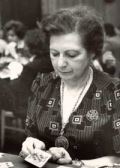Rixi Markus 1910-1992
by Barnet Shenkin
prev/next

Rixi Markus
She fled Austria in 1938 and came to Britain the year before war broke out. I met her in Israel for the first time in 1965. I was 15 she played with me and I made an error discarding a long card in Dummy’s suit. She accepted this with a smile and said “Young Shenkin, I am going to give you a tip, always keep the same length in your hand as you see in Dummy”.
She was not quite so easy with the rest of her partners male and female a like she was a terror both at the table and in the post mortem. Her most famous partner was Fritzi Gordon – the partnership Rixi and Fritzi became a mainstay of British Women’s teams. My late father Louis captained them in the European Women’s Championship in Dublin. After playing them for 18 straight sessions he left them out after he heard them arguing vociferously in the playing area. She caught up with him and said “Zo Louis you don’t vant to win?”.
She always had a friendly disposition towards me and occasionaly I would feature In her newspaper the Guardian where she wrote a column.
In 1984 she kibitzed Coyle and I in Seattle against the top French team who were one of the favorites. We played against Chemla and Perron.
Now Rixi hated the weak no trump which Coyle and I played. A number of good hands came with the weak NT and we gained a lot of points and had a convincing win in the match. The next day Rixi wrote her article in the Bulletin. “I watched Coyle - Shenkin have a good set against Chemla – Perron. Coyle is a good player and Shenkin is very lucky” she wrote.
Rixi was a stout supporter of Terence Reese and defended him after the cheating allegations with an article in the USA published Bridge World. This later became the subject of a libel case. (Scandal at Buenos Aires)
In my opinion she was one of the great characters in bridge. She was a World Champion for Austria and Britain and won 9 European Women’s teams Championships. It would have been 10 but members of her team incurred a slow play penalty in Oslo in 1969 to prevent the British Team winning there. I was present to witness chaotic scenes as they tried to get the penalty overturned - not for the fainthearted.
Rixi Markus played her cards quickly and well. She had to because her bidding often left her in less than the best spot. In my opinion she was one of the best women players of all time.
prev/next